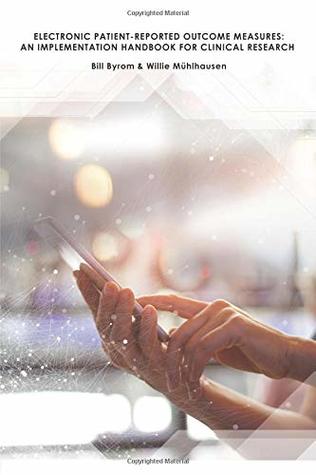Read Online Electronic Patient-Reported Outcome Measures: An Implementation Handbook For Clinical Research - Willie Muehlhausen | ePub
Related searches:
Electronic patient-reported outcome collection systems in orthopaedic clinical practice.
Electronic patient-reported outcomes as digital therapeutics to improve cancer outcomes the following represents disclosure information provided by authors of this manuscript. All relationships are considered compensated unless otherwise noted.
Painlessly captures electronic, and computer-adaptive patient-reported outcomes in a workflow optimized for the in-demand healthcare provider.
Abstract purpose: capitalizing on the promise of patient-reported outcomes (pros), electronic implementations of pros (epros) are expected to play an important role in the development of novel digital health interventions targeting palliative cancer care.
Electronic clinical outcome assessment (ecoa): employs technology such as handheld devices, tablets or web to allow patients, clinicians and caregivers to directly report outcomes, resulting in more granular endpoint data.
Electronic patient-reported outcomes: a survey about acceptance, usage and barriers among german rheumatologists.
Feb 27, 2021 scrolling is a perceived barrier in the use of bring your own device (byod) to capture electronic patient reported outcomes (epros).
Recent studies have shown that 90% of clinical trial patients prefer to use an electronic platform to record their information. In fact, patient compliance levels of over 90% are common with electronic trials while compliance levels for paper-based trials are in the 10-15% range.
Simultaneously routine assessment of patient reported outcomes (pros) has been shown to reliably improve symptom management, identification of psychosocial.
Electronic patient-reported outcome measures (eproms) are online questionnaires which ask patients to self-rate their health status.
Aug 19, 2020 background: electronic patient-reported outcome (epro) systems can improve health outcomes by detecting health issues or risk behaviors.
Outcomes research literature has many examples of high-quality, reliable patient- reported outcome (pro) data entered directly by electronic means, epro,.
Using electronic patient-reported outcomes (epro) for the first time: lessons learned the importance of patient-reported outcomes (pros) is evidenced by their increased use in clinical trials and in drug and device label claims. Here darja turner shares her experiences using an electronic pro tool for the first time.
Jan 2, 2020 in clinical trials electronic patient reported outcome (epro) is more and more a commonly used method.
Nov 10, 2020 patient reported outcome measures (proms) are an easy method for measuring a patient's health status.
An electronic patient-reported outcome tool for the fact-b (functional assessment of cancer therapy-breast) questionnaire for measuring the health-related quality of life in patients with breast.
Mar 25, 2020 utilizing digital health to collect electronic patient-reported outcomes in prostate cancer: single-arm pilot trial.
An electronic patient-reported outcome (epro) is a patient-reported outcome that is collected by electronic methods. Epro methods are most commonly used in clinical trials, but they are also used elsewhere in health care.
Among patients receiving treatment for advanced cancers, symptoms are common and frequently cause distress, functional impairment, and emergency room visits. 1 yet cancer patients’ symptoms often go undetected and unaddressed by clinicians. 2-4 there is growing international interest in integrating electronic patient-reported outcomes (pros) into routine practice as digital therapeutics that.
Patient-reported outcomes (pros) are a type of patient-generated data that provide clinically meaningful.
Acceliant's epatient reported outcomes (epro) platform helps capture and manage patient data in a highly secure environment.
The term patient-reported outcomes (pros) refers to a health outcome directly based on patient self-reporting. Pros are a key aspect of clinical trials and treatments, and in modern health care settings, many organizations are transitioning away from pen-and-paper data collection methods and moving to electronic patient-reported outcomes (epros).
The purpose of the study was to evaluate the reliability, review differences and assess patient satisfaction of electronic patient-reported outcome measures (proms) compared with paper proms.
Helping providers and individuals better manage complex care needs through the electronic patient reported outcome (epro) mobile application.
The current systematic review presents the state of the art of electronic implementations of patient-reported outcome (epro)–based digital health interventions and highlights the contribution of such interventions to palliative cancer care.
Patient-reported outcome measures (proms) are the tools used to elicit patient options.
Epro – electronic patient-reported outcome measures accuracy and integrity of the data collected, back-ups, real-time availability of data, time saving through.
The electronic patient-reported outcome (epro) consortium was established by the critical path institute (c-path) in 2011.


Post Your Comments: